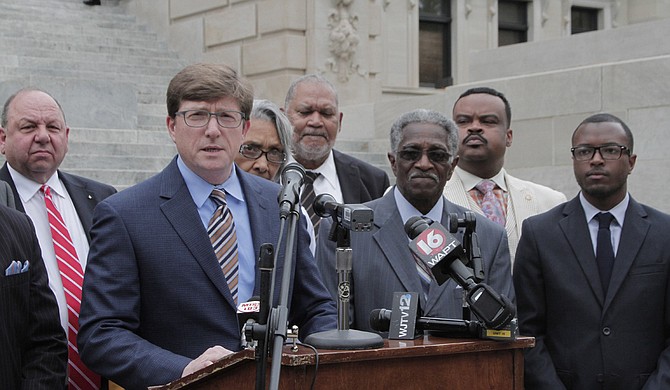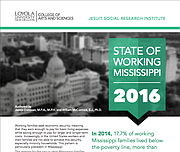House Minority Whip Rep. David Baria, D-Bay St. Louis, has for three years introduced an equal pay act for women, and says he plans to do it again in 2017. Photo by Arielle Dreher.
JACKSON — The Mississippi Democratic Caucus held a meeting Wednesday to discuss key policy issues about the state's economy, tax structure, and how certain policies mostly impact women and African Americans in the state.
Jeanie Donovan, one of the authors of the State of Working Mississippi Report discussed the document with Democratic lawmakers, pointing to the wage gap that persists in the state—not only between men and women, but also between African Americans and white people.
In 2015, the report says, the median wage for African Americans was 72 percent of the median wage for white workers—which means African American workers earned $4.65 less per hour than white counterparts. Women fared slightly better, making 82 percent of the median wage for men (or $2.69 less per hour).
Lawmakers discussed how the tax code and current policies contribute to the persistent gaps. Sen. Hob Bryan, D-Amory, pointed to a Loyola University Social Research Institute report that shows how Mississippi's tax structure imposes a higher burden on the middle and working classes versus the wealthy.
"The average working men and women are paying a different percentage of their income in state and local taxes than the more affluent," Bryan said at the caucus meeting. "And at this moment, in this building, is another group of people meeting with a named goal of shifting that burden to alleviate the burden on the upper-income taxpayers and share more of it with those below."
Republican leaders Lt. Gov. Tate Reeves and House Speaker Philip Gunn maintain that the tax panel will look at all options to flatten the state's tax code, in order to make Mississippi one of the best places to do business.
Some of those options could include a potential Amazon-tax, but if lawmakers follow the conservative Tax Foundation's advice, it will also lead to expedited and continued tax breaks for businesses and corporations.
Donovan told Democratic lawmakers that Mississippi is seeing economic growth but at a much slower rate than other states, and in a way that only benefits certain people.
"There's been a disconnect across the country that's particularly difficult here because (the economy has) been growing slowly, if you're producing more but never earning more, that's a problem," she said. "(The state) is growing economically, but people aren't feeling it, and that's because they don't have any leverage."
House Minority Leader Rep. David Baria, D-Bay St. Louis, focused on improving the wage gap and the economic environment for women in a recent press release. He cited statistics from the National Partnership for Women and Families that show how a working Mississippi woman could provide 77 more weeks of food for her family, or nine more months of rent, if the wage gap were eliminated in the state.
"The real impact of this wage gap is felt daily in the lives of hundreds of thousands of Mississippians," Baria wrote in the release. "Yet, Mississippi's state economist Darrin Webb said he hasn't studied the economic impact the wage gap has on the state because 'no one has requested any kind of analysis like that.'"
Baria said he would submit an "equal pay for equal work" bill in the coming legislative session. He has submitted the same bill, the Evelyn Gandy Fair Pay Act, for three years straight, with no movement from the committee.
Read more #msleg news at jacksonfreepress.com/state. Email state reporter Arielle Dreher at arielle@jacksonfreepress.com.




Comments
Use the comment form below to begin a discussion about this content.